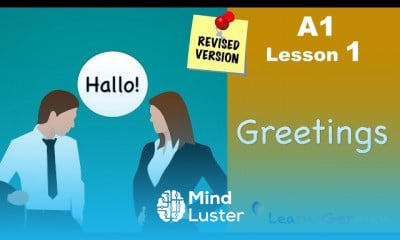English Speaking Situations for Conversation and Practice
Share your inquiries now with community members
Click Here
Sign up Now
Lessons List | 33
Lesson
Comments
Related Courses in Languages
Course Description
What is Listening?
Listening is receiving language through the ears. Listening involves identifying the sounds of speech and processing them into words and sentences. When we listen, we use our ears to receive individual sounds (letters, stress, rhythm and pauses) and we use our brain to convert these into messages that mean something to us.
Listening in any language requires focus and attention. It is a skill that some people need to work at harder than others. People who have difficulty concentrating are typically poor listeners. Listening in a second language requires even greater focus.
Like babies, we learn this skill by listening to people who already know how to speak the language. This may or may not include native speakers. For practice, you can listen to live or recorded voices. The most important thing is to listen to a variety of voices as often as you can.
Listening is the first of the four language skills, which are:
Listening
Speaking
Reading
Writing
In our own language, listening is usually the first language skill that we learn.
To become a fluent speaker in English, you need to develop strong listening skills. Listening not only helps you understand what people are saying to you. It also helps you to speak clearly to other people. It helps you learn how to pronounce words properly, how to use intonation, and where to place stress in words and sentences. This makes your speech easier for other people listening to you to understand!
To listen is to give attention to sound or action. When listening, one is hearing what others are saying, and trying to understand what it means. The act of listening involves complex affective, cognitive and behavioral processes.
What is importance of listening?
To listen, we need to make a conscious effort not to just hear what people are saying but to take it in, digest it and understand. Not only does listening enhance your ability to understand better and make you a better communicator, it also makes the experience of speaking to you more enjoyable to other people.
Our Listening Skills Guide offers strategies and tips for better English listening.
Trends
Human Resources Management
UX UI design
Accounting Finance course
Web Design for Beginners
Graphic Design | Photoshop
Create mobile games using chatGPT
Financial Accounting
UX design career in 2025
Graphic Design Basics
Web Design Using HTML CSS
Logo Design
Skype account setup
Create calculator using chatgpt
UX design essentials
Accounting
Freelance graphic design business
Advanced graphic design
Web Design 101 Free Full Course
Figma Signing Up and Signing In
UX UI design fundamentals
Recent
AI tools basics for content creation
Creative AI tools
AI tools
AI workflow automation
AI Coding for beginners
Building a website with chatGPT
Build android apps with chatgpt
Making app using chatgpt
Create calculator using chatgpt
Build an android app using chatgpt
E Commerce app using chatgpt
Build flutter apps using chatgpt
Earn money with chatGPT
Create mobile games using chatGPT
AI coding tools for beginners
Ubuntu linux
Install dropbox on ubuntu
Skype account setup
Safari browser
Set zoom in firefox browser


















